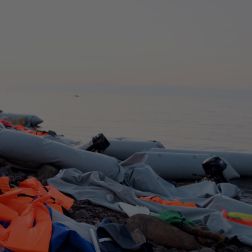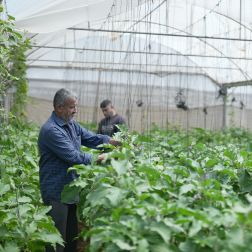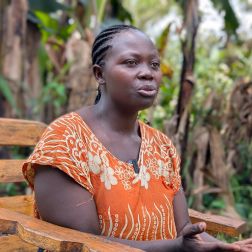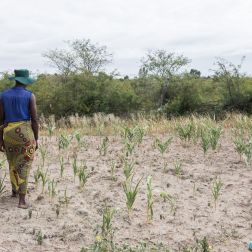- 7 mins read time
- Published: 14th October 2016
The horrors in Aleppo continue to mount
Published Oct 14 2016
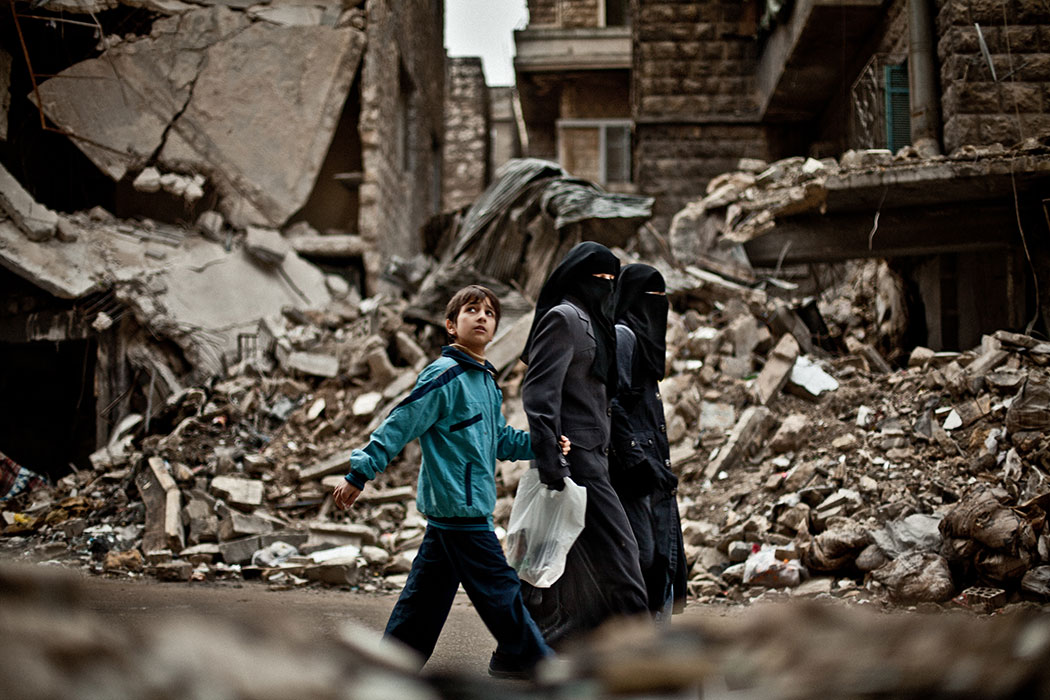
A child watches as a military jet flies over the ruins of the Al Mashad neighbourhood in Aleppo. In neighbourhoods on the frontline where people still live, there is little or no water or electrical energy supply. Photo: Pablo Tosco/Oxfam
As battles rage in the northern Syrian city of Aleppo, the situation is dire – and becoming increasingly intolerable for residents caught up in the ongoing conflict.
250,000 people are trapped in rebel-held East Aleppo with no access to aid and facing constant attacks from the air. The bombardment of hospitals, schools and civilian areas is appalling. There are daily reports of civilian casualties and damage to civilian infrastructure. Food and fuel are scarce and expensive, leaving many vulnerable to the risk of water-borne diseases.
WHAT OXFAM IS DOING IN ALEPPO
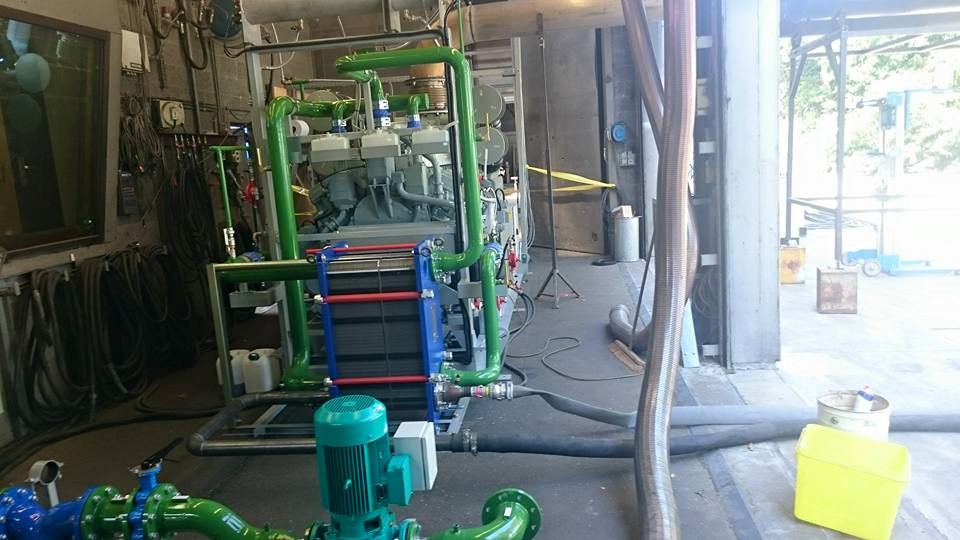
Oxfam has supplied and installed a generator in the Suleiman al-Halabi pumping station, which can supply enough water for a million people in Aleppo. Photo: Oxfam
Oxfam is on the ground in Syria, helping to provide clean water across battle lines in Aleppo, as well as elsewhere in the country.
Oxfam has installed a generator in the Suleiman al-Halabi water pumping station, which supplies most of Aleppo, to power the station when the national grid is down. Oxfam has also equipped three wells in West Aleppo to produce around 500,000 litres per day and installed eight water purification units – though four of them are currently being repaired after sustaining damage – on the Qweik river to also produce 500,000 litres.
Oxfam also has desperately-needed 3,500 hygiene kits ready to be distributed in East Aleppo, but with the continued fighting the convoy cannot currently access the opposition held part of the city.
Oxfam is also working with Syrian refugees in Lebanon and Jordan, providing clean drinking water, sanitation facilities and vouchers for hygiene supplies.
VOICES ON THE GROUND
People still inside East Aleppo have been revealing how the horrors continue to mount. Residents of Aleppo are reporting the use of ‘bunker busting bombs’, which create large craters in the ground, making even underground shelter unsafe.
People on both sides of the city, opposition-held East Aleppo and government-controlled West Aleppo, are now relying on water from wells or delivered by trucks, which are unreliable and sometimes contaminated sources.
Speaking to Oxfam, an East Aleppo resident, Basma* (35), said: “The water network is damaged in some areas, to the point where you can see [bomb] craters filled with water. We are still managing to get water through different means, from local wells. But it’s not safe to go out in the street”.
Nassim* (65), another resident of East Aleppo said: “One of my children went missing five days ago. I spend my day looking for him. Food is scarce. Fetching water from the local wells is another daily challenge, as going out is dangerous and the water quality is an issue. You can’t be sure if the water is safe or contaminated”.
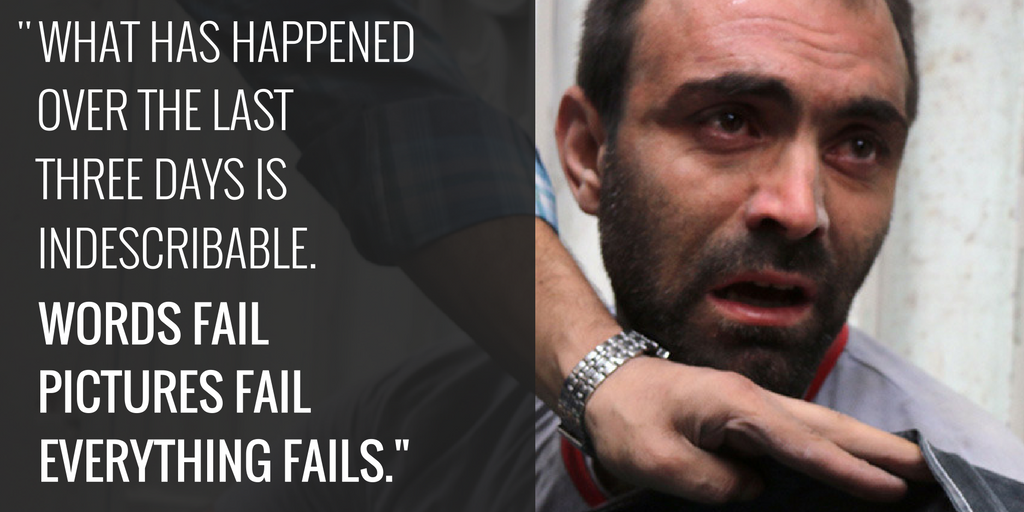
“UNBEARABLE”
Walid* (35), from West Aleppo, said: “Queuing to get water is a time consuming struggle, and buying water is becoming expensive. You need to pay more to get water first from truckers. Winter is coming and we have no electricity, and fuel is not available. The situation is becoming unbearable. If it remains like this, I will leave Aleppo with my family.”
Tayseer* (40), in East Aleppo, said: “We stored bread before this crisis. We have nothing but bread now. You can’t find any shops open. People are sharing their food supplies with each other. We no longer have spices, so we are just boiling the grains that we have. I’m not concerned about myself or my wife, just about my children.”
Nahla* (25) recently fled from East to West Aleppo: “I can’t send my kids to school. And we have no running water, we depend on water trucking. I have no money and no income. Prices are very high in the market. Others in the community have helped me with bread and a bit of food. I can work in cleaning or sewing but I don’t know where to start to look for a job. I don’t know what to do or what will happen tomorrow.”
22-year-old Sham* in East Aleppo: “I don’t have enough food to feed my two brothers and two sisters. Even if we have money, there is no food in the market to buy. We are afraid of sending them to school after the recent attacks. No place is safe now. We don’t know what to do, we feel trapped in our basement.”
Souad* (55) lives in a public park in West Aleppo: “I fled East Aleppo with my grandson. His father stayed in East Aleppo. We are unable to reach him. We just want to hear his voice to make sure he is okay. I have no income and everything is expensive. We are relying on people to help us and on aid workers to provide water and other necessary services. We lost our dignity during this crisis. All I want is to go back home, take care of my garden, and have my grandchildren around me.”
MARIAM’S STORY
Mariam (64) saw her world fall apart when her only son, a father of four, was shot last year in East Aleppo.
Mariam, her daughter-in-law and the children – three boys, aged 11 and twins of 8, and a 4-year-old girl – moved from place to place, driven by the continuous fighting in Aleppo, until they ended up in a small room, with mouldy walls, and inappropriate sanitation.
“I lost my beloved son. My four grandchildren became orphans at a very young age. My heart is broken. I have never felt as weak as I do now. Our only breadwinner left us and now the burden of being ‘the man of the house’ has been placed on the shoulders of my 11-year-old grandson. Finding food and drinking water is a difficult task.”
One of Mariam’s neighbours, who has several water tanks, has been providing water to the family. As for food, they rely on help from other people and some charities. Food prices in East Aleppo have shot up, especially since the area was besieged by government forces. For example, one kilogramme of sugar costs 3,000 Syrian pounds compared to 350 in Damascus.
“I was able to plant some plants in the backyard. When we run out of food, we boil some roots to curb our hunger. As for the water, my grandson has to go fetch it, though it is so dangerous for him to go out.
“I used to think that losing my child was my biggest tragedy, but seeing my four grandchildren and their mother feeling thirsty and hungry is definitely worse.”
WATER AS A WEAPON OF WAR
Oxfam is calling for an immediate and complete ceasefire in Aleppo. At the very least, a pause in the fighting is necessary to deliver food, water, and medical help, as well as evacuate the sick and wounded, and assess damages.
Hospitals have recently been hit by airstrikes. Oxfam is urging all warring parties to ensure that international humanitarian law is upheld and civilians and civilian buildings, including schools, hospitals, homes, and water services, are not targeted to advance military and political objectives.
All parties should refrain from using basic services such as water as a weapon of war.
HOW YOU CAN HELP
* All names have been changed to protect identities.
